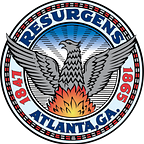Council member Westmoreland highlights smoke-free legislation as Atlanta earns gold medal
The City of Atlanta recently received recognition as a gold medal winner from CityHealth, an organization that regularly evaluates cities on the strength of their policies that aim to make lasting impacts on resident’s quality of life.
The award, in part, was attributed to smoke-free legislation introduced by Post 2 At-Large Council member Matt Westmoreland and adopted by the Council in 2019. The ordinance prohibited smoking and vaping indoors in most public places, including Hartsfield-Jackson Atlanta International Airport. The comprehensive legislation aimed at making Atlanta a healthier city for residents, employees and visitors officially took effect Jan. 2, 2020.
“I was really excited that the Council’s initiative around the smoke-free ordinance in spring 2019 was kind of the issue that pushed us over line to receive a gold medal,” Westmoreland said. “It’s exciting to be listed along major cities like New York, Chicago, Los Angeles, Dallas, San Antonio, and Seattle, which I think have a reputation of making strides on certain public health issues and it’s cool to have Atlanta be in that group of cities leading the way for the country.”
The importance of health and healthcare policy has taken on added value and urgency this year in the wake of the COVID-19 pandemic. Westmoreland noted that there are policy areas beyond what are generally tied to public health that can also make an imprint when it comes healthier living.
“One of the things that I like about CityHealth is the fact that its emphasis on public health is connected to almost every issue we deal with on a daily basis,” Westmoreland said. “Everything from housing to streets to early childhood education to greenspace access — all of that ends up coming back to a quality-of-life and public health issue. I appreciate having an organization that can focus cities’ attention on those topics and then pushes us to meet certain benchmarks that in turn lead to having a higher quality of life for our residents.”
Prior to 2019, Atlanta was the only major city without a comprehensive smoke-free ordinance. Westmoreland noted that it was especially important for Atlanta to join its peer cities in adopting similar legislation.
“I think Atlanta rightly considers itself right up there in the same league with other major American and global cities, and so, I was excited to help be a part of the process for us to pass this legislation, so that we could join every other major American city,” he said. “Also, when you are home to the world’s busiest airport and 25 out of the other 30 busiest airports are smoke free, I think that it was long overdue.”
He added that the smoke-free legislation takes on added importance to set an example for Atlanta’s youth.
“As a former teacher, there’s an epidemic of e-smoking among American teenagers that is really serious to me. It was important that Council showed leadership in messaging to young folks that vaping is dangerous and something that doesn’t have a place in Atlanta,” he said.
Westmoreland said he’s also looking forward to the next phase of metrics from CityHealth, though some of the benchmarks require changes to state law.
“It’s worth noting that some of the ways that CityHealth says it’s important to protect the health of residents is actually against state law, which points to changes that have to happen at the state level in addition to the municipal level,” he said, noting in particular metrics related inclusionary zoning and paid sick leave. “I look forward to the next phase of metrics that they’ll be providing, so that we can continue to make Atlanta a healthier and safer place for all who call it home.”
